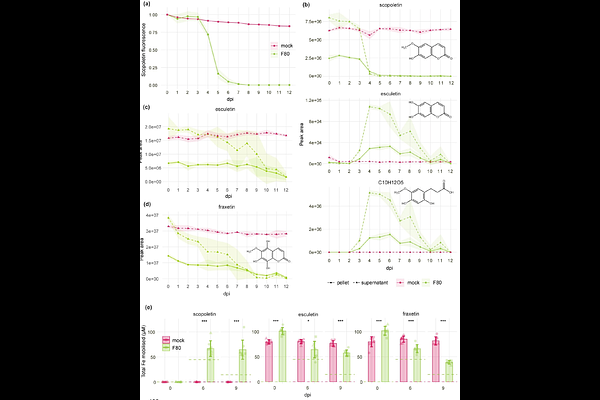Cooperation between a root fungal endophyte and host-derived coumarin scopoletin mediates Arabidopsis iron nutrition

Cooperation between a root fungal endophyte and host-derived coumarin scopoletin mediates Arabidopsis iron nutrition
Van Dijck, L.; Esposto, D.; Huelsmann, C.; Malisic, M.; Piro, A.; Giehl, R. F. H.; Balcke, G. U.; Tissier, A.; Parker, J. E.
AbstractIron acquisition is a critical challenge for plants, especially in iron-deficient soils. Recent research underscores the importance of root-exuded coumarins in modulating the root microbiome community structure and facilitating iron uptake. However, interactions between root-associated fungi and coumarins in plant iron nutrition remain unknown. We investigated the mechanism by which a fungal endophyte, Macrophomina phaseolina (F80), enhances Arabidopsis iron nutrition. Fungal-coumarin interactions were assessed by profiling metabolites and measuring iron mobilisation in F80 cultures supplemented with specific coumarins, alongside quantifying growth performance and iron content in Arabidopsis coumarin-biosynthesis mutants inoculated with F80. Our findings reveal that an interaction between the coumarin scopoletin and F80 in the rhizosphere rescues plant growth under iron-limiting conditions by resolving the iron mobility bottleneck. F80 exhibits a capacity to modify scopoletin into iron-chelating catechol coumarin esculetin, thereby releasing available iron. We conclude that Arabidopsis-produced scopoletin functions as a precursor for fungal conversion into iron-chelating coumarins. By extending the role of coumarins from bacterial to fungal members of the root microbiota, this study places coumarins at the centre of commensal-mediated enhancement of plant iron nutrition across microbial kingdoms.